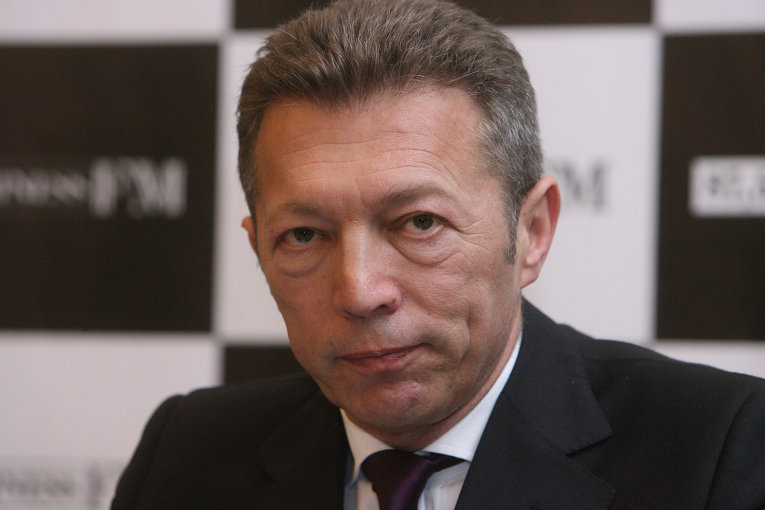MOSCOW, April 16 (RAPSI, Ingrid Burke) - London’s High Court of Justice held Tuesday that claims filed by Arkady Gaydamak against his business partner and diamond giant Lev Leviev should be dropped in connection with a 2001 Angolan diamond-trade agreement that went sour, according to court documents obtained by RAPSI.
Gaydamak was described in Tuesday’s judgment as “a wealthy Israeli businessman of Russian origins.” After developing an interest in the diamond trade, he claims to have played an instrumental role in creating a commercial structure in Angola that would keep rebel hands off the country’s diamond supply, thereby thwarting attempts to fund rebel actions.
Wanting to remain under the radar, Gaydamak asked Leviev, “another Israeli businessman of Russian extraction,” to hold his interest. Both businessmen reached an agreement in 2001 which stipulated that Leviev and Gaydamak shared equal ownership rights over all assets and activities connected with the mining, distribution, and trade of diamonds that had occurred in Angola and Zaire [presently, the Democratic Republic of Congo] since 2000.
Hundreds of millions of dollars flowed from Leviev to Gaydamak until transfers abruptly halted in 2005, according to documents. As a result, in January 2011 Gaydamak took Leviev to court in London.
In August 2011, Gaydamak travelled to Angola, where he met with high-ranking official General Kopelipa. The general’s position “can apparently be best described as the equivalent of Prime Minister in Angola,” as vaguely explained by Tuesday’s judgment.
During the meeting, Gaydamak signed a release form, which stated that a dispute had arisen between Leviev and him, and that the parties had agreed to terms for full and final settlements of the conflicts. The English court proceedings were referred to in the form specifically.
The agreement provided for the release of all claims between Leviev and Gaydamak, but contained no provision dealing with the payment or transfer of funds.
After Leviev raised the 2011 release document in court, Gaydamak claimed that he had only signed it because General Kopelipa fraudulently misrepresented the facts – having led Gaydamak to believe that if he signed, Leviev would compensate Gaydamak in exchange for surrendering his rights.
“General Kopelipa made it very clear that if I did not settle with Mr Leviev, the attitude of the Angolan authorities towards me would be very negative, but that if I did sign a settlement agreement, I could expect to receive the full cooperation of the Angolan authorities and administrative protection in the form of a diplomatic passport with a Presidential Administration mandate conferring diplomatic immunity," Gaydamak said, according to court documents.
The 2012 judgment found that the 2001 agreement had been valid. However, the judge found that General Kopelipa had merely offered to try to use his influence to persuade Leviev to compensate Gaydamak. Thus, Gaydamak lost the 2012 claim.
Gaydamak failed at various attempts to challenge the 2012 ruling.
At this juncture, Gaydamak sought to launch a new case involving the 2011 agreement along with a new conspiracy claim. The new case listed among the defendants: Leviev, General Kopelipa, and an Angolan businessman who had also attended the 2011 meeting.
Against Leviev, he sought compensation and various other orders and declarations. He sought damages for breach of trust, intimidation, and deceit from the two Angolan defendants. He sought conspiracy damages against all three.
Leviev, in turn, filed a motion challenging the claim against him on the basis that it should be barred by abuse of process or action estoppel, a legal doctrine that prevents claimants from attempting to reassert facts or claims that were already established by a court.
The court found that Gadamyak had failed to defeat the conclusion that it would constitute abuse to allow the new proceedings to move forward as they raise issues that should have been raised during the first proceedings.
With regard to Gadaymak’s desire to introduce fresh evidence to the case, the court found that the evidence could have been introduced in the initial case, but that it was not considered important enough at the time. The potential impact of the new evidence only became clear in light of the following judgment.
“Every party’s case would be different if they were allowed to run it with the benefit of a judgment which demonstrates how a judge actually views matters, but one has one action, not two, and every party has to make decisions as to how material is likely to impact the trial and then live with those decisions,” the court concluded.
The court found that it would not be necessary to reconsider the conspiracy claim, as Gaydamak had not successfully undermined the settlement agreement.
Accordingly, Gaydamak’s claims against Leviev were struck out of the action.



